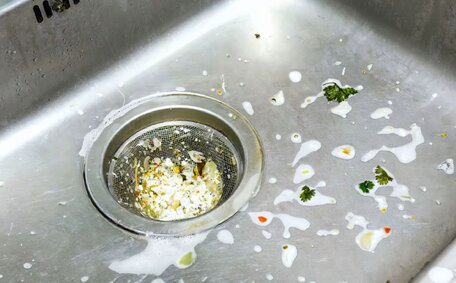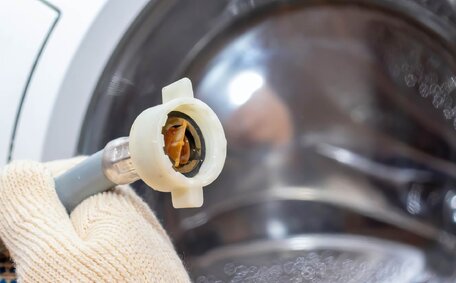What are chemical drain cleaners and how do they work?
Chemical drain cleaners remove clogs in drains and pipes by dissolving blockages. The main types of chemical drain cleaners are:
- Alkaline drain cleaners: Contain strong alkalis like sodium hydroxide or potassium hydroxide that can dissolve organic materials like hair, grease, and food waste. They generate heat reaching approximately 100°C to melt clogs.
- Acid drain cleaners: Contain strong acids like sulfuric acid that dissolve mineral deposits, soap scum, and some organic materials. Not as effective on grease.
- Oxidising drain cleaners: Contain oxidizers like potassium nitrate that break down organic materials through an oxidation reaction. Often used for severe clogs.
These chemicals succeed in clearing pipes by either dissolving the blockage through chemical reactions or disintegrating it for unimpeded flow. However, considering the cons of chemical drain usage, there’s no denying that these cleaners can be incredibly harsh on your pipes over the long term.
The pros of using chemical drain cleaners
They effectively dissolve clogs
Chemical drain cleaners can tackle a range of obstructions, including those caused by tree debris, highlighting their effectiveness. They are designed to penetrate, melt, and occasionally even clear away stubborn obstructions such as those caused tree roots blocking drainage pipes.
Most chemical drain cleaners, such as max gel formulations, are ready-to-use and can be poured directly into the drain, quickly reaching and treating the obstruction. This makes application straightforward and efficient, enabling you to sort out your plumbing issue without special equipment or expertise.
The potent acidic, caustic, or oxidising agents in drain cleaners swiftly react with clogs to clear blockages efficiently. They generate heat and release gases to quickly dissolve substances that are heavier than water, thereby unblocking the flow.
Chemical drain cleaners contain potent solvents that effectively dissolve all types of clogs, from hair and grease to soap residue.
Caustic soda and potassium hydroxide are particularly effective at dissolving organic clogs, such as those caused by hair and grease. Sulfuric acid-based cleaners, on the other hand, efficiently tackle inorganic mineral deposits and stubborn soap scum.
By penetrating and rapidly dissolving blockages, these drain cleaners quickly restore flow in plumbing systems.
They are easy to use
A significant advantage is the ease of using chemical drain cleaners compared to manual methods. Most drain cleaners come as ready-to-pour liquids, gels, or powders for direct introduction into plumbing systems. To use, simply sprinkle or pour the cleaner into the drain, no special equipment required.
Natural drain cleaners like vinegar and baking soda are easy and safe to use without plumbing expertise. The application process is straightforward enough for anyone to manage within a few minutes. This ease of use makes a chemical cleaner an accessible option for those looking to swiftly address drain blockages.
However, it’s important to follow all safety instructions when using strong chemical drain cleaners to avoid hazards.
They work quickly
One of the significant benefits is delivering fast-acting results, which is why many consider them the best drain cleaner for immediate solutions. As soon as the chemical agents come into contact with the clogging substance, they initiate powerful reactions that quickly break down and clear blockages.
Drain cleaners are typically formulated to manage various clogs, working effectively within minutes of application. The caustic, acidic or oxidising agents begin dissolving and penetrating the clog immediately, rapidly working to clear your blocked pipes.
This makes chemical drain cleaners an ideal solution when you’re facing an urgently clogged drain. Without requiring any mechanical action, These cleaners can chemically eliminate obstructions and restore water flow in as quick as 5 to 30 minutes.
While commercial drain cleaners act immediately, safer home remedies like baking soda and vinegar may be better for septic systems to avoid pipe damage. More natural methods like vinegar baking soda often take longer but are gentler on plumbing.
They can damage pipes
Although chemical drain cleaners clear clogs quickly, they can also cause damage to pipes with repeated or improper use.
The heat exceeding 100°C from the chemical reaction could potentially warp or melt PVC pipes. Meanwhile, caustic alkaline or acidic drain cleaners can eat away at pipes over time, leading to leaks or making them more prone to subsequent blockages.
Frequent use can harm the internal walls of pipes and lead to deterioration. They damage the protective coating inside pipes, allowing rot and corrosion to set in.
If leaks or drainage issues persist after using chemical drain cleaners, consider consulting a plumber to improve your drainage system. More natural solutions like boiling water or baking soda and vinegar may be safer long-term alternatives.
They are toxic
Chemical drain cleaners contain harsh caustic, acidic and oxidising agents that can lead to significant health hazards if used improperly. It is crucial to be mindful that the fumes can irritate respiratory pathways and eyes when dealing with these cleaners. Meanwhile, skin contact can result in burns or blisters.
Caustic drain cleaners with sodium hydroxide or sulfuric acid can cause severe irreversible damage if splashed in the eyes or swallowed, so always adhere to safe conditions and privacy practices. These chemicals can be fatal if ingested.
Ensuring safe use of chemical drain cleaners is crucial—always follow safety precautions like wearing gloves and avoiding inhaling fumes. Ventilate the area and never mix products. Due to the potential health hazards, natural drain clearing methods are preferred over toxic chemical drain cleaners.
They are harmful to the environment
Chemical drain cleaners can have negative impacts on the environment, both from their ingredient composition and improper disposal.
Many chemical drain cleaners contain volatile organic compounds (VOCs) that evaporate into the air, potentially permeating into your living space. Their acidic, caustic or oxidising agents can also harm aquatic life if leaked into waterways untreated.
Allowing chemical drain cleaner residues to enter municipal wastewater systems untreated can damage sewage infrastructure over time and disrupt water treatment processes. Meanwhile, directly pouring them down outdoor drains can pollute gardens and leach into groundwater.
It’s essential to know about the correct containment and disposal of any remaining chemical drain cleaner, adhering to manufacturer guidelines and local regulations. Otherwise, these products can indirectly pollute natural habitats and drinking water sources.
They are expensive long-term
While commercial drain solutions may seem affordable short-term, repeated use can lead to high long-term costs.
Frequently using chemical drain cleaners instead of addressing underlying issues often leads to a cycle of worsening clogs, requiring more applications over time. Using multiple bottles of chemical cleaners can lead to high cumulative costs.
Pipe repairs or replacements due to chemical damage may lead to significant costs in the event of leaks or flooding. The cost of repairs due to damages from drain cleaners can surpass the initial savings.
Professional plumbing services can be more cost-effective in the long run compared to property damage from chemical drain cleaners.
In most cases, Infrequent use of milder, safe solutions like boiling water, baking soda, and vinegar is gentler on pipes and wallets over the long term.
Safer alternative options
Using a plunger
If we would appreciate manually dislodging clogs, plunging with suction and pressure can clear drains effectively sans chemicals. Important reminders include ensuring a tight seal and cleaning up diligently after use to prevent any residue from causing secondary clogs. Cover overflow holes and plunge vigorously 15-20 times, repeating as needed.
Boiling water
Boiling water poured down drains can naturally melt and dislodge grease, hair, and soap deposits. Allow to fully drain, repeat if needed and flush with cold water to solidify the leftover grease.
Baking soda and vinegar
Baking soda and vinegar create a foaming reaction that can help break up clogs in the drain. Allow the foaming to subside completely before flushing with hot water.
Enzyme-based drain cleaners
Enzyme drain cleaner can use beneficial bacteria to biologically digest organic matter, offering a pipe-friendly solution. However, the results are slower compared to caustic chemical drain cleaners and may need multiple applications.
How to prevent clogs
Here are some tips to help prevent clogs from occurring in the first place:
Use drain strainers
Placing drain strainers over openings can prevent clogs by catching hair, food scraps, and debris. Clean strainers regularly.
Limit fats/oils down drains
Avoid pouring fats, oils, grease, and other organics down sinks to prevent build up and the need for acid drain cleaners. Allow fats and oils to cool and solidify, then dispose of them in the garbage.
Moderate soap usage
Residues from cleaning products such as hand soap or shower gel can accumulate inside pipes. Try limiting soap usage where possible.
Dispose waste properly
Never flush wipes or paper towels as they can cause blockages; only flush human waste and toilet paper.
Regular maintenance
Schedule professional drain inspections and cleaning every year or two to clear any minor blockages before major clogs occur.
For assistance with preventing or clearing household clogs, contact Burwood Plumbing for professional drain cleaning services.






